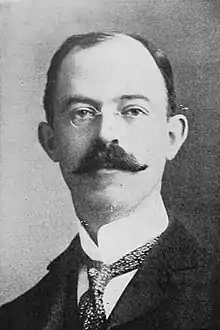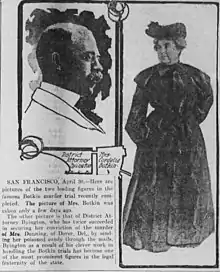Lewis F. Byington | |
|---|---|
 | |
| District Attorney of San Francisco | |
| In office 1900–1905 | |
| Preceded by | Daniel J. Murphy |
| Succeeded by | William H. Langdon |
| San Francisco Supervisor | |
| In office 1898–1900 | |
| Personal details | |
| Born | May 24, 1868 |
| Died | May 7, 1943 (aged 74) San Francisco, California |
| Nationality | American |
| Political party | Democratic |
| Profession | Lawyer |
Lewis Francis Byington (May 24, 1868 – May 7, 1943) was an American lawyer, author, and Democratic politician who served on the San Francisco Board of Supervisors (1898–1900) and as District Attorney of San Francisco (1900–1905).[1][2]
Early life and education
Byington was born on May 24, 1868, in Downieville, California. He was a son of Lewis Byington and Catherine Freehill Byington.[2][3]
Byington went to public school in Downieville. He graduated from Santa Clara College, now the University of Santa Clara, and in 1887 graduated from the University of California Hastings College of the Law. He subsequently practiced law in San Francisco.[1]
Career
Lewis Byington was a member of the California bar. His practice was in the Supreme Court and Federal Courts of California.[4][5]
In 1898 he was elected to the San Francisco Board of Supervisors.

In 1899 he was elected San Francisco District Attorney, serving from 1900–1905.[6] As District Attorney, he prosecuted the murderer Cordelia Botkin.[7] He was elected a further two times.[8]
Byington was president of the San Francisco civil service commission under Mayor James Rolph.[9]
In 1935, Byington became president of the San Francisco Public Utilities Commission, which provides water and electric power services to the city. He held this position until his death in 1943. As president, Byington oversaw the completion of the aqueduct and tunnels of the Hetch Hetchy system that brought water to San Francisco.[10]
Private life and affiliations
Byington was unmarried. In retirement, he made his home in San Francisco.[2]
He was vice president of the California Historic Landmarks League and served as president of the Native Sons of the Golden West. On September 15, 1912, Byington acted as chairman of the ceremonies, during the dedication of the new NSGW, speaking to the audience about the history of the building and the difficulties in its completion.[11]
He was also a member of the University of California Club, the National Geographic Society, the San Francisco Lodge, and the Benevolent and Protective Order of Elks. He was a principal speaker for the celebration of California's admission to the Union.[1]
Death
On May 7, 1943, Byington died of pneumonia at Stanford Hospital, San Francisco. He was 75 years old. Funeral services were held at St. Mary's Cathedral. He was buried at the Holy Cross Mausoleum.[2]
Publications
Byington wrote the following books:
See also
References
- 1 2 3 San Francisco and its Municipal Administration 1902, Hon. Lewis F. Byington, page 46
- 1 2 3 4 "L. F. Byington Dies in S.F." Oakland Tribune. Oakland, California. 1943-05-07. Retrieved 2020-04-12.
- ↑ Byington, Lewis, The National Cyclopædia of American Biography, 1941
- ↑ San Francisco: its builders, past and present, pictorial, p. 249
- ↑ "Encyclopedia of American biography. New series". American Historical Society. New York. 1895. Retrieved 2021-10-05.
- ↑ Municipal Reports for the Fiscal Year 1898-99 By San Francisco (Calif.) Board of Supervisors
- ↑ "TWO LEADING FIGURES IN THE RECENT BOTKIN MURDER TRIAL]". the Tacoma Times. 1904-04-30. Retrieved 2015-08-16 – via Chronicling America.
- ↑ "Lewis F. Byington". San Francisco Chronicle. 12 Jan 1916, Wed • Page 40. 12 January 1916. p. 40. Retrieved 28 October 2021.
- ↑ Reno Evening Gazette, Sept. 14, 1931, p. 15.
- ↑ Report of the San Francisco Public Utilities Commission. San Francisco, Calif. : The Commission. 1933
- ↑ "Native Sons Dedicate New Building". The San Francisco Call. San Francisco, California. 16 Sep 1912. p. 3. Retrieved 2021-10-05.

